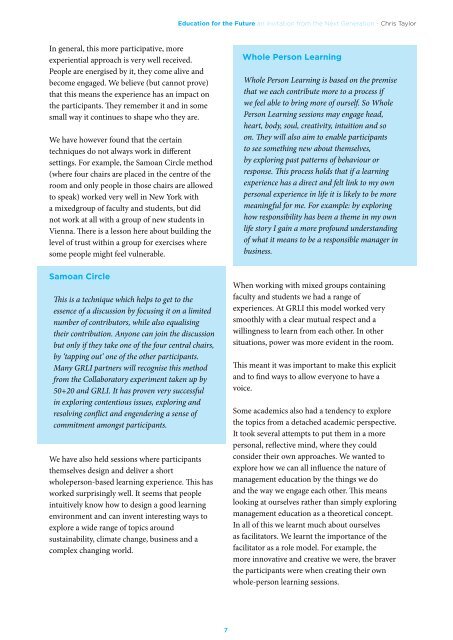Relations
GRLI_magazine_14_final_screen
GRLI_magazine_14_final_screen
You also want an ePaper? Increase the reach of your titles
YUMPU automatically turns print PDFs into web optimized ePapers that Google loves.
Education for the Future an invitation from the Next Generation - Chris Taylor<br />
In general, this more participative, more<br />
experiential approach is very well received.<br />
People are energised by it, they come alive and<br />
become engaged. We believe (but cannot prove)<br />
that this means the experience has an impact on<br />
the participants. They remember it and in some<br />
small way it continues to shape who they are.<br />
We have however found that the certain<br />
techniques do not always work in different<br />
settings. For example, the Samoan Circle method<br />
(where four chairs are placed in the centre of the<br />
room and only people in those chairs are allowed<br />
to speak) worked very well in New York with<br />
a mixedgroup of faculty and students, but did<br />
not work at all with a group of new students in<br />
Vienna. There is a lesson here about building the<br />
level of trust within a group for exercises where<br />
some people might feel vulnerable.<br />
Samoan Circle<br />
This is a technique which helps to get to the<br />
essence of a discussion by focusing it on a limited<br />
number of contributors, while also equalising<br />
their contribution. Anyone can join the discussion<br />
but only if they take one of the four central chairs,<br />
by ‘tapping out’ one of the other participants.<br />
Many GRLI partners will recognise this method<br />
from the Collaboratory experiment taken up by<br />
50+20 and GRLI. It has proven very successful<br />
in exploring contentious issues, exploring and<br />
resolving conflict and engendering a sense of<br />
commitment amongst participants.<br />
We have also held sessions where participants<br />
themselves design and deliver a short<br />
wholeperson-based learning experience. This has<br />
worked surprisingly well. It seems that people<br />
intuitively know how to design a good learning<br />
environment and can invent interesting ways to<br />
explore a wide range of topics around<br />
sustainability, climate change, business and a<br />
complex changing world.<br />
Whole Person Learning<br />
Whole Person Learning is based on the premise<br />
that we each contribute more to a process if<br />
we feel able to bring more of ourself. So Whole<br />
Person Learning sessions may engage head,<br />
heart, body, soul, creativity, intuition and so<br />
on. They will also aim to enable participants<br />
to see something new about themselves,<br />
by exploring past patterns of behaviour or<br />
response. This process holds that if a learning<br />
experience has a direct and felt link to my own<br />
personal experience in life it is likely to be more<br />
meaningful for me. For example: by exploring<br />
how responsibility has been a theme in my own<br />
life story I gain a more profound understanding<br />
of what it means to be a responsible manager in<br />
business.<br />
When working with mixed groups containing<br />
faculty and students we had a range of<br />
experiences. At GRLI this model worked very<br />
smoothly with a clear mutual respect and a<br />
willingness to learn from each other. In other<br />
situations, power was more evident in the room.<br />
This meant it was important to make this explicit<br />
and to find ways to allow everyone to have a<br />
voice.<br />
Some academics also had a tendency to explore<br />
the topics from a detached academic perspective.<br />
It took several attempts to put them in a more<br />
personal, reflective mind, where they could<br />
consider their own approaches. We wanted to<br />
explore how we can all influence the nature of<br />
management education by the things we do<br />
and the way we engage each other. This means<br />
looking at ourselves rather than simply exploring<br />
management education as a theoretical concept.<br />
In all of this we learnt much about ourselves<br />
as facilitators. We learnt the importance of the<br />
facilitator as a role model. For example, the<br />
more innovative and creative we were, the braver<br />
the participants were when creating their own<br />
whole-person learning sessions.<br />
7


